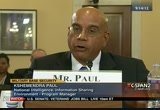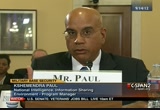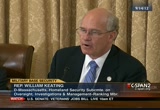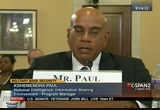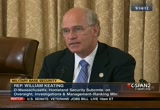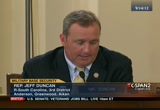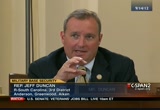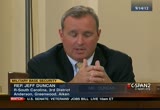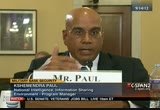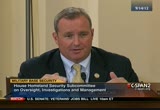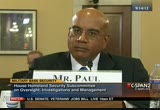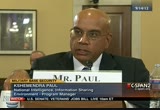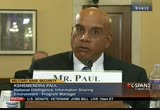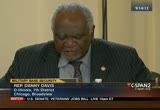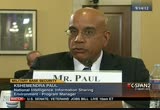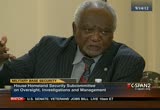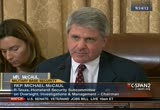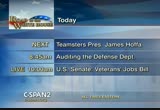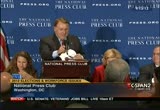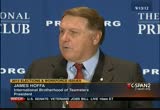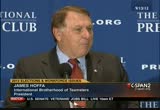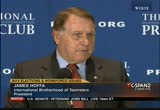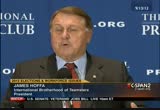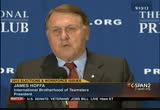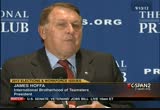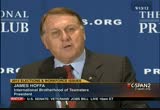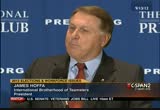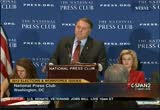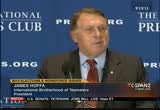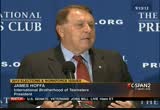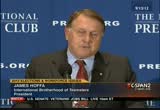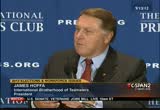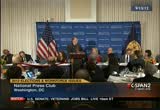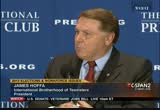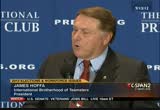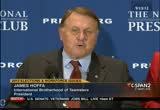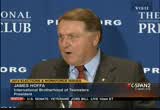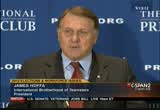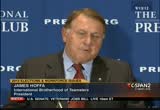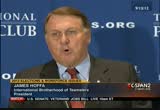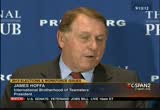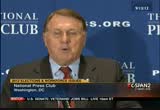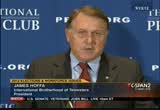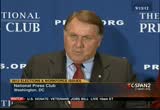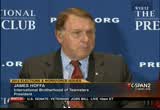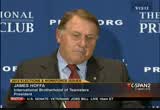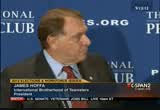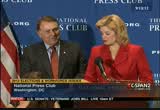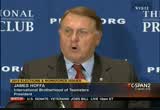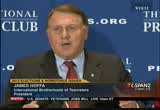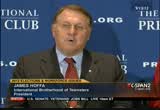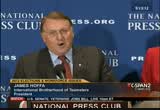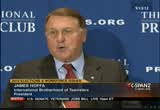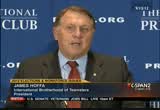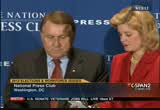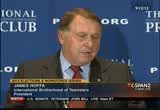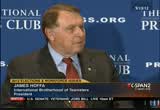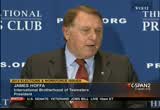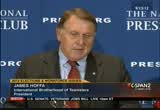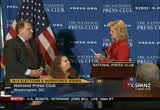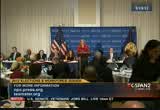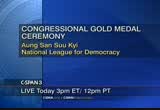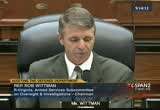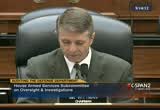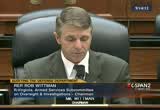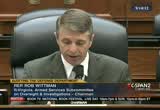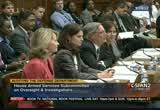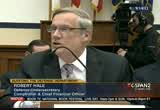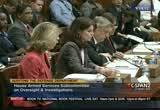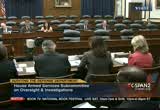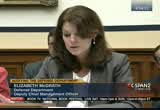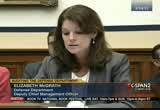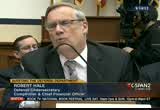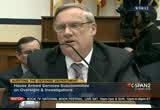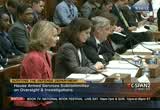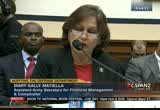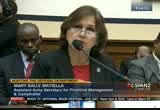tv Today in Washington CSPAN September 19, 2012 7:30am-9:00am EDT
7:30 am
of the answer in terms of dealing with the enterprise agency, even with the cultural issues, just accelerating the work spent the other thing mr. leiter mention is were talking about a patchwork system. he referred to having six regional areas perhaps as an approach that would be affected. what you thing in terms of that? because i do think the more you have it under one roof, so to speak, even though it might be an i.t. roof, more that is there, the better off we are. his reference having six regional areas, sort of a better step than we have now in this patchwork quilt. do you think that would be effective as well? and communicating with getting the same message at the process by which is used and shared is the issue, too. >> the information sharing by
7:31 am
design, by statute is distributed to centralize environment that interconnects existing systems. so the focus would've is on interoperability but not just at the tactical level. it's not about pipes and things like that. that's an important component but it's more. it's at the policy level, business process level. so we think it's key to keep that focus on interoperability so that you can see both share the information. fiesta approach around the regionalization, that's a focus on cordoning federal activity which i think it's a good thing, something we've heard from our state and local partners. it's something we're working through the different government structures. >> i would just as you this, too. we had a hearing in houston actually, for houston and security to one of the things that came out of that was the need, first line, the need for local police to be there and to be one of the most important point in terms of the information. i must tell you, it's my feeling, all the areas, we talk
7:32 am
about all the higher governmental areas, department of defense, fbi. i just don't see enough effort or enough success at that local level, sometimes that information can be just a catalyst to spring the network of information that really will tell us something. what are your recommendations that really do a better job at the local level of having them be part of that information network? and i know there's agencies who don't want to go down to that level for fear some of that information might be breached it by the other side of that is, without sharing that information at the local level you could really lose probably the most important information that you can have in front of you, and the most time sensitive way. >> had some successes of government with a national network of fusion centers, and their increasing maturity's, those efforts, close involved
7:33 am
with fbi and doj and other federal agencies. i talked about the czar initiative before. 300,000 police officers in this country have been trained, the first time that i know of where these police officers have been through the same training that was around the behaviors i mentioned earlier. so there is some success that way. it's at risk right now because of the fiscal situation, and this goes to come to energy question, when i talk to my state and local stakeholders that comes back loud and clear. and we look across that landscape, 18,000 police departments and 90% of which have 50 or fewer sworn officers, there's a real concern about the smaller departments which make up for the book of law enforcement how to integrate them into the national architecture. so focus of our office and worked with her stakeholders is to look at solutions like regionalization. it's controlled by states or statewide information sharing environment, or co-location.
7:34 am
there's a variety of different approaches and their talker and annual report by think thoughtful solutions like that to help bring people together to have a common information infrastructure or at a key part of you with his financial system as was knitting together into a smaller structures. >> is to be clear, they are saying if there was a federal money, to go to that kind of training, then they would be more apt to participate and be a part of this. you think from their vantage point? >> when i talk to the state and locals and the federal, there's a key focus on making sure that as we have these investments today, in the fusion centers and and other initiatives, that we are looking at making them as effective as possible by expanding the usage with this model agencies and also looking at overtime other priority crimes, other priority threats
7:35 am
that allow them the business case to be made more effectively for these to develop support for. >> thank you. i yield back. >> the gentleman from south carolina, mr. duncan. >> thank you, mr. chairman. mr. paul, thank you for your work. your vision and your goal for information sharing that will help prevent future attacks on this country and just help law enforcement in general, and mine, are similar, or showed really. so i thank you for the work. and in subsequent hearings or a pastor and come with all the agencies, dhs, state, but information sharing between those agencies and some of the things that i've learned that if someone, and i would use the case of maybe of these overstay, and someone, dhs was looking into someone who may or may not have overstayed their visa, and addressing the background of the person sometimes they had to
7:36 am
come out of one database or system and actually log into another and come out of that system and actually log into another and i even heard and ms-dos type program our database is still being used and that kind of had even heard the word dos in some years that kind of caught me by surprise. busters all passwords, entry level. so instead of having one password or one biometric system where you could, one person could into one time and get in all the databases that they need, they're having to remember all the different passwords and that gets frustrating. they end up not doing a complete search because of the frustration level. so i just share that with you because i think you need to know that. that's what i'm hearing from people that currently work in different levels of government. in your prepared statement, you talk about the transformation of information ownership the information stewardship, which i think that's a very valid point.
7:37 am
and do you believe we've reached that point of information stewardship? and in my experience there's still holdouts today, 11 years after 9/11, three years after fort hood, where folks refuse to partner or share their information. they still consider they've got ownership of that and they really don't want to share it, for whatever reason, whether they want to hold themselves up to their superiors as the person in the know or the personal is the ability to move up in the ranks. we see the and the private sector as well. how do we overcome that? or are we overcoming that come and what do you foresee in the future? >> thank you, that's a focus of the work of my office and i appreciate mentioning the stewardship. it's taken us a long time as a government to develop the silent structures, the programmatic structures and with lots of policies around information that is space on classes of information, specific to agencies or bureaus.
7:38 am
the vision that i talked about, that director clapper talked about, is more focused on policy, are on classes decision to the foundation called it and authorized use standard. it's a big job to look at body of policy we have and how do we transition it to making decisions about information sharing discover build and things like that based on the classes of decisions, requires tactical infrastructure with the networks that are secure, identity management works across the networks them across different organizations, across different levels of government were with more consistency in how we can put policy in terms of in the computer systems. this is a lot of work that is a big turn in front of us. we have had some successes. one that i will mention is related to this. one mr. latta was talk about was a success. would so make it stop i state
7:39 am
and local law for the and there's a hit on the watchlist, we have a process that where that information gets back to the local fusion centers and the joint terrorism task force in a timely manner. so that's important again to bring in state and local enforcement into having that situational awareness of what's going on in their communities. so there's more processes, work to do. but it's a valid point and that's where we're headed. >> i applaud the fusion centers. i see it as the first platform as long as those platforms are integrated to talk to the higher platforms so that the higher up authorities have, the ability to go to one platform and be able to google, so to speak, use that term, not necessarily that company but your name and find that everything that someone had a -- at a decision-making level needs to know about. and so i applaud your work. i appreciate this committee.
7:40 am
the questions that have been raised here. and mr. chairman, i really don't have anything else. >> gentlemen, the gentleman from illinois mr. davis, is recognized. >> thank you very much, mr. chairman. and thank you, mr. paul, for your testimony. governmentwide there have been challenges to development of unclassified and classified systems, information sharing. in particular, in dhs, has had problems in the past of developing and deploying these information sharing systems. let me ask you, how will the recent round of cuts to the budget impact development of some of the systems, and how can we make sure that they are developed and get to state and local and tribal governments that need them?
7:41 am
>> it's difficult to comment on the cut specific to dhs but i do want to highlight that, dhs with her classified network, has conductivity out to the fusion centers, and they've been making some stellar progress with the homeland security network. we've also been to a lot of work to drive interoperability across dhs system, fbi leo, law enforcement online, the intel link system and intelligence community and also the grant funded state owned risked net so that's a coronation of the office of interoperability by our philosophy there is no wrong door. there any fusion center working in the police department, you can get into these systems and find information. we've made progress a stalker in
7:42 am
annual report i don't want to overstate the. there's still a lot of work to do there. we do think that having consistent standards and architecture working with industry to make sure that we are not building systems and then trying to interconnect them in a runoff manner, that kind of a jury rigged approach is not the right way. the right way is to have a consistent architecture that is used across these different systems of our state and local partners and work with industry and standards organizations to make sure that identity management is done in a consistent best practices way that would implement access based authorization and control so people can discover information. so i think that it's a challenge. we've made some substantial progress. i do want to highlight the key to making this progress is a vector with integrated our state and local stakeholders into our governance. and we do that both in a variety of ways but in particular we
7:43 am
focus on working with professional associations and that gives us a big bill to help drive culture change because its bottoms up and it's includes. spent let me ask you, it's my understanding that the guarding system set up by the fbi, it's one of major part of the suspicious activity reported, and is the main way the state of local enforcement share information on suspicious activities with one another. and with the federal government. how helpful has the system and has sars in general been for federal counterterrorism effort in and can you give an estimate of how me state and local law enforcement's have led to
7:44 am
federal cannot terrorism investigations? >> the suspicious activity initiative is foundational to our domestic counterterrorism activities, critical integral part. there's approximately 20, maybe a little more now, i can give you precise numbers -- i can give you the precise hours after the hearing. in the suspicious activity reports that are embedded in the stand that my office has published, or something on the order of 40,000 searches in what's called a shared space. that's the electronic will come if you like, at the fusion centers and the joint terrorism task force is another participants used to share this information. numerous cases have been opened by the fbi. i believe those numbers are for official use only so i would like to respond for the record, or to wait for those numbers. did "the guardian" system is one of two technologies. the other is called shared
7:45 am
space. they're interoperable. important thing is they work within the functional standard anti-comment process routing information flows from the citizenry to industry, critical infrastructure key resource sectors to local law enforcement to the fusion centers and the joint terrorism task force is shared for analytical purposes. >> and i was just suspect that the number, that there would be some serious increase in the reporting of suspicious activity. >> there's a substantial number, a substantial number of investigations that are across this nation related to suspicious activity reporting data directly out of the star system or starlike activity. it's foundational. spent thank you very much. i have no further questions. >> i thank the gentleman.
7:46 am
mr. paul, i just want to conclude by saying that we have representatives, the victims and their family members here today at this hearing. i think the federal government deserved or should, give, given an apology, a formal apology as to what happened and should call this what it actually was but it was an act of terrorism. and i do believe that the families of the victims need to be compensated. adequately. and given our deepest respect. and as for this member of congress and this committee, you have my assurance that will do everything we can to make sure that happens. and so with that, the hearing record will be opened for 10 days and without objection this committee is adjourned. [inaudible conversations]
7:47 am
7:48 am
>> teamsters president james hoffa says labor is under attack and the 2012 presidential election will decide the fate of workforce and social issues. from the national press club in washington, d.c., this is one hour. >> thank you, madam chair is an. it's a great pleasure to be here at the press club at this auspicious time. there's so much going on in our country right now and it's a great pleasure to be a with so many friends and so may people from the media and to talk about what the issues are today. first of all i want to talk about the teamsters union a little bit, and talk about the fact that, you know, as madam president said come i was elected in march of 1999.
7:49 am
we're very proud of what we've done in the teamsters union. we've taken this union from the union that was bankrupt, falling apart literally, and made it is what it is today. when we took over, this union was a union where sister -- local against local, joint council against joint council. there was chaos and we came in and reached out and reached out to the people that opposed us to say, enough, we cannot have a civil war in this union. we must unite this union. and fortunately we have. we are building strong union and we are united today. we thought we had an election. i'd like to talk about the fact the teamsters union has 1.4 million unions, we are in united states, canada, 150,000 members in canada. we are in puerto rico. we are the most democratic union in the united states. we are very proud of it. an effective we are elected by the members. we are not elected by business
7:50 am
agents. we are elected by ballots being mailed out to members all over the place. we mail out $1.4 million. they come back, and i running it over here, my secretary treasurer, a great slate, we won roughly two-thirds of the vote and i bet barack obama would like to have those numbers. we are very proud of what we've done, and it shows the fact is in a tough economy, in tough times, we are getting the job done. it's no secret we're in the middle of a tremendous recession. we have 23 million people out of work but you will have to go back, i had to laugh at the convention, talking about the fact they were trying to blame barack obama for what happened as it no one remembers the bush administration and no one remembers always with hank paulson and t.a.r.p. that everyone seems to have forgotten that, the fact is that's what a catastrophe happen. that's where those days when wall street was going to collapse.
7:51 am
we had aig, lehman brothers. we all remember that. it wasn't that long ago and that's with the collapse begin. so we've been fighting out of that, and he we are, three and half years, we're not out of it yet but it's better today than it was. so we are fighting back and getting thing done. as you heard, the 23 million people are out of work. the teamsters union is surviving in this economy. we are fighting very, very hard. we have a great union and we find people who want to be organized. we organize more than 150,000 people in the last five years. that is a tremendous achievement. in this economy come in these tough times, because we've been able to reach out to bus drivers. we been able to reach out to port workers, to airline pilots, airline mechanics. we've been able to organize when other people have not. so our union while other unions have gone down, has kept its numbers and we're very proud today to have to teamsters with us, james over here from ups over here. and tiffany from our local union
7:52 am
a legion which just organize, she's an airline pilot. one of the things really say about that decision, which i like to say because sony keep aside we are all to drivers. well, it's not true. i always say the teamsters union is a tizzy. airline pilots to zookeepers. san diego zoo, thank you. so we have people everywhere and we are a wonderful union that is diversified. with court reporters, lawyers, we have police officers. we really are a diverse, diverse union that covers the entire country and canada and we're very proud of the fact we been able to achieve so much. one of the things we talk about all the time is, today, bring up today, really starting with 2010, something i give speeches on all of the country is a war on workers. right now there's a tremendous war going on beginning in 2010 the battle to basically take on let him put them into place, basically destroy them if we had
7:53 am
12 states were right to work was introduced. simultaneously. so that just didn't happen. we basically saw what happened with regard to number of states like ohio, wisconsin, indiana, michigan, pennsylvania where we had governors, republican governors elected. and we saw all we saw all of the sudden a tide of anti-union legislation, right to work paycheck deception, basically controls on collective bargaining. we all saw the battles that happen in wisconsin and ohio. and i was very, very fortunate to be part of the. i was in madison, wisconsin. we had 100,000 people at the state capitol protesting the fact that the governor taken away collective bargaining for public employees. and we had a tremendous battle there, and today we have been able to get an injunction against that law, and even though we were not able to recall scott walker in the recall election, we took back
7:54 am
the senate so we stopped all the craziness for a while and wisconsin. so that the battle we are fighting to ohio is the same with. john kasich gets in and what do we see? all of a sudden taking on collective bargaining. no collective bargaining for public voice. that's unheard of in america. all of a sudden they see things differently and they get a republican house, republican senate and are able to jam these things through. and off to the races we can. we really have a problem and they were able to basically pass along that basically stopped collective bargaining. but fortunately in ohio, and again, this is labor working very, very hard, they have the citizens veto. and basically we were able to get over 700,000 petitions, get it on the ballot, and overwhelmingly the action to the legislature were defeated and we are able to restore collective bargaining. and the same thing going on elsewhere. indiana, michigan. we see what's going on everywhere. where did all this come from?
7:55 am
it really is coming out of what's called the tea party. we didn't have this type of attack with republicans or democrats. we didn't have it 10 years ago. and all of a sudden there's this tidal wave of attacks on organized labor, and basically almost a cultural change that we see going on in this country. and italy some juicy. i've been around for a while and i've never seen and we really are fighting back. but i want everybody to know that the unions are basically fighting back along with other people to say we're not going to let this happen. you saw what we did in ohio, and we are fighting very hard to make sure we restore the balance in this country. we have seen a tidal wave of things that i don't think anybody's thought they would ever see. you know, never seen this type of activity with regard to the tea party, with regard to 2010, this tidal wave of change in this country. and really there's a cultural war going on. all of a sudden we see in many, many states legislation being
7:56 am
introduced to basically suppress the vote. so you have to get this type of id. there's articles today in the paper that say in pennsylvania it could basically suppress 800,000 votes in pennsylvania because of the new law there. we see it everywhere else, and people are fighting back that because its bases, who's introducing that? this is the tea party and the right wing trying to suppress the vote. i had to laugh, jim cramer who's on television, the guy, the stock guy, he wrote the thing saying even under this law his father couldn't vote was 90 years old and has never missed a vote but he doesn't have the id so he can't vote this time. i think somebody finally got him. patches scioscia extensive this is when you see what's going on in this country to basically suppress the vote. we also see a tidal wave of action with regard to pro-choi pro-choice, attacking pro-choice, attacking women's rights to medical health, the
7:57 am
right to choose. again, we have over 33 states have introduced laws like that and we see what's going on in virginia right now. really extreme measures that we didn't see before but it's part of a cultural revolution that is going on with regard to the republicans and the koch brothers and everybody else, to say that they want to change america back. and basically what we're getting down to is that's the choice that's going to happen on november 6. this is coming down to almost a cultural choice. this is more than mitt romney versus, you know, barack obama. this is becoming almost cultural. it's a cultural change is the type of changes they want to make in this country. and i think it's extraordinary that we see this going on today. it's amazing that we see what's going on with the attacks on labor. let me say why the attacking labor. the right wing believes and knows that labor is the backbone of the democratic party, the
7:58 am
backbone of the progressive movement. we have basically the ones that back, the hour of the eight hour day. all the basic reforms would take for granted were passed by organized labor going back 50 years, 100 years. we are the backbone and we still are they. we are strong, we are organized, we have money and with boots on the ground. now, we're basically fighting this attack we're under right now, the war on workers, that we've never seen before. and basically that is something completely new. they are taking this on because they realize if they can knock out later, if they cannot go public employees, if they can knock at organized labor with the national right to work, but they can basically turn this country around the they will have a free run because we are the only ones who stand in the way of this movement that they have that basically is out there to turn america far to the right. so that's the ballot and that's the reason why we are under attack, you know, as never before. we have to keep battling on.
7:59 am
we simply i attended the democratic convention. it was an amazing event. i'm a democrat. no surprise. it was amazing when you contrast that convention with the republican convention which i watched on television. you know, you had all these speeches from the republicans talking about our forefathers, talking about and, uncle, what a tough life they had, how they got here. but i did anybody talking about the voucher system. i didn't hear about tax cuts for the rich. i didn't hear about cutting medicare, medicaid. i didn't hear about getting rid of food stamps are cutting them back. they didn't talk about what they really believe in and what's on their website. and what's in their platform. basically in their platform for the first time they have basically national right to work. they are against the minimum wage. they want to get rid of the inheritance tax if they want to
8:00 am
get rid of capital gains. i didn't hear anybody talk about that at the convention. if they talk about the they would never get elected. so they think they can go to this convention and basically talk about their forefathers and a great this country is and how we got 20 million people unemployed but not lay out a plan to say, the way we're going to put people back to work is if tax cuts to the rich. what an idea. wow. so that's what they believe and they should have said that because that's what they running on. be honest with the american people. ..
8:01 am
>> nothing ever happened during those eight years. and they want to tell everybody, the people today, that history began when barack obama took over, he's responsible for the recession, he's responsible for people being unemployed. everything's his fault, and none of the things that george bush did during his time with t.a.r.p., with lehman brothers and the collapse of wall street, that never happened. so we're starting from day one. a new calendar. so it's very unusual what's going on, and i think that it's amazing. i hope people have seen that and are talking about that. you know, you talk about being anti-labor. one of the reporters when i was out -- there's a lot of media out there, and he was saying to me, do you think a chance that labor and republicans can get together in the future? i looked at him and said, you know, they want national right to work, they want to get rid of
8:02 am
project labor agreements, they want to get rid of everything we have worked for for the past 40 years. they have never been this extreme. now, there was a time when people talked to maybe a mix son or maybe in another -- nixon or maybe in another era there was some talk, but not anymore because things have changed, and the republican party has veered so much to the right, i think it's amazing both culturally, they have become the far, far right of this country. and it reminds me, and i'm old enough to remember the john birch society, and i remember it, many of you do too, the john birch society and barry goldwater, and he ran against lyndon johnson in 1964. they had this right-wing idea everybody was a communist, all this stuff, and i see, basically, the same thing today with the tea party. and i understand some of the research shows that the koch brothers, that their forefathers were part of the john birch society.
8:03 am
so, you know, it's kind of come around. new john birch society, now it's called the tea party. but it's basically, again, to go to a far-off place and roll the clock back to 1890. and that's what we're facing today. the other thing that impressed me was, you know, i looked at the democratic party, and i saw all different people there, and i said this is the big tent. they have everybody there. they have labor, women, gays, they have hispanics. it's the big tent. and when i looked at the republican party, all i saw was the 1%ers. when you look at the face of those people at the convention, i thought it was like looking at the rotary club. so that's kind of the changes that we have right now. so we're basically talking about where do we go from here and what can we do for this country right now. you know, i think that, you know, the battles are coming up. this election is going to decide a lot. every election we have talked about forever is always i
8:04 am
remember every speech every four years we always say this is the most important election ever. well, for the first time this is the most important election ever. because this election is really going to decide everything. it's going to decide whether the rich get richer or whether we're going to have food stamps, whether we're going to have social security, whether we're going to have medicare. it's going to be a weardshed in this -- watershed in this country. and the question is, who's going to win and what's going to happen in the senate, what's going to happen in the house. these are all issues that are going to be decided november 6th. so we're working very hard to get the vote out, other unions are working to make sure we get people registered, get people to the polls. with regard to money, we have never been able to spent as much -- spend as much money as the far right. i was reading an article recently about who's backing mitt romney, where's he getting his money from? it was interesting.
8:05 am
it's of course it's our friends, the koch brothers, and then there's a guy who owns the venetian in las vegas. he says he's going to put in maybe $100 million. he already put in $10 million for newt gingrich. that's not a very good bet. and he didn't do very well on that one. and then there's a guy named harold simmons. remember the swift boats? he's the guy that did the swift boats. he's a multibillionaire. bob perry, another swift boat guy putting millions of dollars into this campaign, a guy by the name of jim davis. these are names you really don't know every day. jim davis, he's got new balance shoes, one of these right-wing guys, he's going to put millions of dollars into this campaign. and then we've got the marriott people, two people that are going to inherit the marriott hotels. nice hotels, crazy ideas. they're putting millions of dollars into this election. and then, of course, we've got our friend karl rove, and he's got his crossroads of america, he's putting in millions of
8:06 am
dollars. what i'm getting at is you've got a handful of people, maybe 6-8 people that are probably going to spend more money on this election than all of organized labor, and i would say over 100 million americans. they won't put that kind of money in this election. and i think people have to say is that good for the country, is that what our forefathers really saw that a handful of people, 6-8 people, can put more money in an election and control events more than maybe 100 million people that work with their hands every day, the 13 million people and their families that are in the labor movement and the other people that are not in labor movements out there working every day and doing the hard work. and there's something wrong with that, and that goes back to citizens united. citizens united, basically, was the worst thing that ever happened to this country right now. it's upsetting the balance in democracy. i think obama's going to win, but what does this portend for the future if this keeps on? eventually, they get richer and richer, and more and more money
8:07 am
goes into these campaigns. and we see these ads. these ads are persuasive, they're well done, and they can take a good candidate and turn them into the devil. and this unlimited money is unbalancing the entire political spectrum, so something has to be done about that, and i suggest we're going to have to have a constitutional amendment to change that. we've got to start talking about other things. after november 6th we've got to talk about what are we going to do and how do we start rebuilding america. well, i think it's going to be a decisive election. i think that ram barack obama's going to win. but once he wins, what does he win? four more years of the same thing? he hasn't won anything. does he win a congress that doesn't want to pass any legislation? does he have a mitch mcconnell that says my job is to make him fail, and i will make sure that he fails? is that what we want for the next four years? so we're going to have to really think about if he wins and when he wins, what does he win and where do we go from here? how do we change america?
8:08 am
and i would suggest a couple things. we've got to, number one, start bringing jobs backs to this country. 23 million jobs, many of these jobs are gone forever. there's something wrong with a country that as rich as we are that say we can't balance our budget. there's something wrong when the very rich people of this country, the people i've been talking about, you know, don't pay their fair share of taxes, and when they want to move their taxes from 4 or 5%, they say, oh, we can't do that, and that holds up everything. there's something wrong with that. there's something wrong when some of our biggest corporations in america don't pay any taxes at all. general electric, boeing, verizon. how can you make billions of dollars? development care what lawyer you have, you should be paying taxes. and you can see how that would help us balance the budget if we had more income. but they have found a way to wheedle the system. i had to laugh -- not laugh, it was tragic -- general electric not only didn't pay any taxes after they made billions of
8:09 am
dollars in this country, but they got a rebate. that's amazing. and there's something wrong with our tax laws. we've got to change our trade laws. we've got to bring, basically, change the law that says you will be rewarded in the tax code if you bring jobs back, if you build factories here. we have corporations right now, i was reading this morning, moody's says that corporations are sitting on over $1.5 trillion in cash right now. moody's this morning. why aren't we putting that money to work to start rebuilding this country? what are they waiting for? is something going to happen, some bell's going to go off? start investing in this country. and they've got to do that. and we've also got to start making sure that we, like i said, change citizens united. we've got to have a constitutional amendment to get this back in sync where, you know, somebody doesn't have 100 million times more opportunity and more clout than i have because he can buy ads and do things like that. we've got to have more american stimulus bill. we've got to start rebuilding
8:10 am
our roads. we've got to start doing the infrastructure. and these are the things that people have been fighting us on. the president tries to rebuild the infrastructure, and they say, no. he says he wants to build airports and do the faa, oh, he says no to that. he wants to extend unemployment benefits, they say, oh, no, we're going to hold that hostage. every issue he comes up with that helps america rebuild he's being opposed by the republicans. and we've got to find some way to change that. what i suggest is after this election we're going to have to have a sit-down. and i think that the president -- i don't tell the president what to do, i'm sure he knows what to do -- but sit down with the republicans and say do we really want this for america? do we want four more years of deadlock where we can't balance our budget, where we can't move ahead, we can't put people back to work because of politics? the old story about the red states and the blue states, you know, we've got to tell them we are the united states, and that's what we've got to start doing. and we've got to start making
8:11 am
sure that these people change their way. and the mitch mcconnells of the world that say it's my job to make him fail, does he really want to have four more years of failure? does he see as an american that that's good for america? i say, no. and i say that somehow we have to, basically, appeal to the better nature of their resources to say how do we start together rebuilding this country, how do we start doing the things that we have that will put our fellow americans back to work, how will we start getting new jobs that make people have a good living and a good life in this country? how do we create opportunity in this country? and i think that is the key issue that america faces after this election. so i think that can be done. i want to thank you for being here. it's great to be here. thank you very much. great to be here. [applause] >> when you took office, you appeared at the republican convention and talked about the teamsters being bipartisan.
8:12 am
that didn't happen. why? >> that's true. we appeared with the, at the republican convention, and basically we felt that we could build bridges to the president at that time, bush, and we found that after a short period of time they were not sincere, that we could not -- they didn't want. we said, okay, i'm here for the photo ops, i'm for that, but we want to do this with regard to trade, we want to do this with regard to jobs, and they said, well, that's not what we're talking about. we just want to use you. and we said this is not the sincere, this is not why we're, you know, we reached out to you. so we felt we could reach out to them. it didn't last very long. we found out that they really weren't sincere about, you know, helping labor, helping people get their jobs back, and after that we got a divorce. [laughter] >> supporters of unlimited money in politics say the citizens
8:13 am
united decision just evened the playing field with labor by spending millions on behalf of its favorite candidates. how do can you respond? >> well, as i was just saying, they are going to spend hundreds and hundreds of millions of dollars. if you just take the eight people that i listed, and that budget all the super pacs, all the different pac we have. all of unions, first of all, where does the money come from unions? it comes from americans. it comes from workers who contribute money themselves to a campaign, to our pac. they go into their pocket and, basically, say i want to be part of the political process. and what we spend is basically so small compared to what they have. as the old story is, we've got the boots on the ground, but they will outspend us 8 to 1. they outspent us in wisconsin, in ohio, and they're going to outspend us in this election. so there really is no comparison, and i think citizens united was a terrible decision, a political decision, and i think that we've got to -- the
8:14 am
way the court's set up, it'll probably be a long time to change it, and i think we need a constitutional amendment, otherwise it's going to destroy america. >> how much money do you plan to spend on the 2012 campaign? >> that's a secret question. but we'll be spending, you know, what we always spend. but it's not enough. i mean, you know, we do not have enough money to do what we want with regard to this campaign. we can't reach out the way we want to. we have to, basically, call our local unions to say will you finance people to go out and campaign, will you do that with your treasury. because the international doesn't have enough money to do it, so we have to go to our locals, to our joint councils and get to do that. but specifics we don't give. but we're going to do, basically, you know, the money we get from our members and do as much as we can, but again, we'll be outspent 8 to 1. >> what are you doing to insure that teamster members vote and that they vote for president obama? >> well, we're basically going
8:15 am
out and talking to people. i was saying in our building we probably had four or five hundred people, i plan to stump all over this country talking to union members and telling them, you know, keep your eye on the prize. basically, vote your pocketbook. these people are out to take away your group on. they're going to take -- union. they want to take away what you take for granted. all of our people make good money, and we're very proud of what we've done, proud of the contracts, proud of the standard of living, proud that we have brought people into the middle class. and sometimes our members don't understand that. and i'm going to pull out my wallet and say look at this wallet. vote your wallet because this is about you and your family. if you didn't have this union, you wouldn't enjoy the life you have, you wouldn't have the health care you have, you wouldn't have the pension that you have. so we're going to go out and preach that everywhere, and we're going to be hitting all the battleground states, and i'm looking forward to it. >> if you tell them to vote with
8:16 am
their wallet and they're worse off today than they were four years ago, how do they justify voting your way? >> i don't think people are worse off than they are. i like that question. that was the big buzz word, are you better off today. why don't you ask the autoworkers in michigan and ohio who were laid off and are now pack to work? ask the car haulers who are back to work because the auto industry's going on. ask some of the thousands of people that work in parts suppliers that are basically back to work right now. they are better off. you take michigan where i'm from and ohio, we have lower unemployment than the national average. things are better. >> what lessons does organized labor take from the political and legal fight over president obama's health care reforms? >> well, you know, the health care reforms, you know, i think are good because i think this country needs, basically, national health care.
8:17 am
we didn't get it. we've got something that's not national health care, but it's something that will give health care to 30 million people. it does cause some problems for unions structurally, but overall how could you argue with the fact that you're going to be able to get insurance if you have a pre-existing illness? and how can you argue with the fact that your kid can stay on your payroll, your insurance til you're 26? how can you argue with the fact that you're going to remove caps if you get really sick and go over a million dollars, you're going to have coverage? there are so many good things in the affordable health care act that i think it's good, and i think that that's what we're talking about to our members and telling them that. >> how do you want congress and the president to avoid the fiscal cliff later this year, the impending combination of tax hikes and automatic budget cuts? >> well, that crisis is coming and, again, that's exactly what i'm talking about after this election. there really has to be a sitdown. somebody has to say, okay, we
8:18 am
won. now what do you want to do? do you want to do the same thing you've been doing for four years, or do you really want to solve america's problems like we were sent here for? i think that's the issue we face, and i think that's the issue that's going to come up to solve that problem. and it's amazing, the problem is going to be huge, but i think that, you know, basically, the democrats and the administration, i think, is going to go all the way with this to say we have to have change, we have to have more revenue. you know, at one point the president basically said i'll do 10 to 1. you give me a billion dollars in new revenue, and i'll cut $10 billion. that's a hell of a deal, and they didn't take it. that's amazing. and i think we're back to something like that. but i do think that, you know, there will not be a crisis. i think, hopefully, they will solve this problem. but if they don't solve the problem, they will do some, basically, a midterm -- they'll do some kind of a jerry rig to get by the crisis, and you will
8:19 am
not have the cuts that are prescribed. >> how much should the fed do to strengthen the economy through monetary policy? >> what's that? >> how much should the fed do to strengthen the economy through monetary policy? >> the fed's doing a lot, doesn't seem to be working, but i know people are refinancing. i think it's helping the economy. i know many businesses are refinancing, they're talking about a new stimulus coming up, and these are all things that have to be done, um, and, you know, the republicans are against any stimulus. one of the things i like to talk about is the fact that anybody that doesn't tow the line with the republicans, they go after. the tea party goes after them. and i think about arlen specter who voted for the stimulus who was a republican, and the minute he did that, they ran somebody against him. and that's just amazing. and anybody that doesn't tow their line, they basically go after them because with them there's only one way, and that is no compromise. the words that we need to bring
8:20 am
back are bipartisanship and compromise because that is how deals are going to be made. and those are words that seem to have disappear prd the republican lex -- disappeared from the republican lexicon. >> does labor consider itself to be part of the solution to the current economic woes, and what specifically can labor do to bring america roaring back? >> i think we can continue to do what we're doing, number one, elect barack obama. i think that's number one. number two, i mean, we're out there basically working on legislation, we're working on plans to get america moving again, put people back to work. we're working with the administration, the democrats in the house and the senate, to come up with bills that are going to where we can start rebuilding america, shovel-ready jobs where we can get bridges, roads, tunnels rebuilt, put people back to work. we've already seen it with the auto industry. we need more of things like that that are putting people back to work that are real, and you can count, and you can look at them and say 100, 200,000 people are
8:21 am
back to work because of that action, and that worked. >> how can labor help challenge foreign companies like foxcon to make the american century? >> well, that's probably one of the really embarrassing things with regard to foxcon. that's apple, right? and it's just amazing that, you know, we have all this going on and a company like, you know, as rich as apple continues to farm out all their work. you know, why can't they build a plant in california? what would be wrong with that? why can't they start bringing jobs back? and then, of course, we have the scandal about foxcon. if you don't know who that is, they employ like 400,000 people in china and making these computers and laptops and things like that. and they really have terrible working conditions. and it's become a scandal.
8:22 am
and that's something that the way to solve that, we really can't do much with china, but what we can do is to say let's bring those jobs back here where we have decent wages and safe working conditions. [applause] >> beyond traditional union-friendly manufacturing and service jobs, how is organized labor evolving to match a changing economy, one that must keep costs low and flexibility high? >> well, we're doing everything we can. you know, if you see these charts -- and i think the charts are real -- where they show american productivity of workers, it's going up like that. you see the wages of the average american, they're flat. i was talking to some economists yesterday. they talk about the lost decade, that people today in america, working people, have not advanced. not in our union, but generally they have not advanced in the last ten years because of the crisis, because of the crash, because of a lot of reasons. they have not gone up. their lives have not gone up.
8:23 am
but the productivity has gone up for a lot of reasons. now, with that kind of productivity it seems to me that our workers should be sharing in the rise. if your productivity is rising, traditionally, you are rewarded for your productivity. in this economy they are not being rewarded, and that must be changed. so that's one of the things we have to do. it's not about cutting wages, it's about, basically, making sure that people work hard, making sure we find new ways to get the job done. you know, look at some of the things that uaw has done where they have preserved jobs and yet been very, very competitive. so there are ways to get this job done, and it takes new and innovative ideas. basically, productivity is up, and the american workers need a raise. >> the focus lately has been on public sector unions and politicians taking on collective bargaining. do private sector and trade unions have to worry about similar attacks? how can they survive in an anti-union atmosphere? >> well, that's basically the
8:24 am
same, i've been talking the war on workers. that's exactly what it is. in one of the states the republican politicians came to us, and they said, you know, we just want the -- we really just want the public employees. we're not after you. you guys are okay. we didn't believe them. but that's what they were trying the to tell us so we wouldn't oppose them. but in the labor movement we realize an injury to one is an injury to all, and we are very strong in standing with our friends and our compatriots that are in the public sector. um, we really have to keep standing with them. they didn't divide us. but one of the things they are trying to do is divide us and say they don't mean us. >> what needs to change for private sector unions to grow again? >> well, i think we need an economy. number one, the economy's down. if the economy comes back, i think you're going to start to see everything expand. basically, companies will start investing. we do a lot with regard to
8:25 am
transportation. transportation is very, very tighted whether it be ups or trucking, tied very, very close to the economy. it's a barometer of the economy. how many things are being shipped. and we really see that bumping along. it goes up, and it goes down, but it really hasn't taken off. we need to get this economy moving again. and hopefully, we get by in this election we can start doing things that gets the economy moving again because a growing economy will fix all that, and that's all you need. >> which is the bigger challenge for organized labor today, rell van or branding? -- relevance or branding? is. >> or what? >> branding. >> i think it's organizing. we've got to go out and get people in our union and get more and more people to the polls, more and more people to believe in our union like, you know, like tiffany here. just 300 people just joined our union. that's what this is about, making sure that we're strong, making sure that people believe in the teamsters' union or the
8:26 am
uaw. whatever union it is. join a union right now. you know, i was -- it was funny, i had an interview with somebody down in north carolina at the convention, and they were saying, you know, what do you tell people of north carolina that have 12% unemployment? you know what i told 'em? join a union. [laughter] >> seven years ago your union joined with ufcw, seiu, hotel and restaurant workers, the laborers and the carpenters to form a new federation called change to win. some people have called change to win change to seiu or lose change. the labor and hotel workers are now back in the afl-cio, the car pen iser thes dropped out. -- carpenters dropped out. isn't it a total flop? >> we don't think it's a flock. we're very, very close to ulcw, which is a large union, the seiu is even bigger than ours. we have very, very close working
8:27 am
relationships. and what we've found and the reason why we left the afl-cio -- i have nothing bad to say about them, but we wanted to emphasize more organizing because that is our core of what we want to do. and that, we felt we could do that better outside of the afl-cio. but i want everybody to know that with regard to politics, with regard to social issues that even though we're in another federation, the teamsters, the seiu, we work extremely close with our friends in the afl-cio. we know each other, we have respect for each other, we eat dinner together, so, basically, we are united in one cause, to make america stronger. >> the teamsters have had a number of bitter battles with a small aircraft union. what is so bad about amfa? >> well, amfa, i always call it a phony union.
8:28 am
they talk about it being a, you know, post office box in connecticut. and that's about what it is. and they have really done nothing for workers. and, you know, we're out there in the airline industry, and we're making success, we're getting good wages, we're getting good contracts, and we're making sure that people are protected. amfa really comes in, and they sell people a bill of goods like they did at northwest airlines, and they basically caused strikes they shouldn't have. most of those people got replaced. so they really are a parasite with regard to the labor movement, and we really don't need them. >> the teamsters are one of the few unions gaining membership. how do you get more workers into unions, and do you think the decline in unions mirror the decline in the middle class? >> i think things are very, very tough. if we had a better economy -- we are successful. the teamsters are successful in organizing, but i think everybody would do better if
8:29 am
people were building factories or putting people back to work. i think you would see more growth in the labor movement. and although, you know, other unions are growing and trying to do that right now, but the low economy, i think, is very, very hard. there's a lot of fear out there. you know, people have lost their savings, that lost decade i was talking about. and they've lost their decade. they've lost their wages, they've lost their homes, the value of their homes are down, their 401(k)s are down. a lot of fear out there right now. what we need is a robust economy to get people getting interested in getting strong again with regard to making sure their futures are assured. >> when the labor movement faced epic struggles in wisconsin and ohio, you joined with the afl-cio and its member unions around what you called the labor table. what did that experience tell you about the need for one labor federation and a coordinated campaign for all organized labor? >> we're very proud of what we did at the labor table, basically, some of the things i
8:30 am
was talking about. on the war on workers with regard to ohio, wisconsin, indiana, michigan, we formed labor tables where all of us pooled our money to, basically, put good people on the ground in every state to fight these battles. in other words, it wasn't just the teamsters doing their thing or the seiu. we pooled our resources into one idea, and it really worked well. um, and we're not ready to go back, and we don't intend to go back. but we're going to continue to do that because we realize with regard to politics, with regard to the attack on working families we have to be together, and we do pool our money. and the labor table has been a big success for us, and we're very proud of it. >> the teamsters have been under a consent decree since 1989. when do you think it will be lifted? >> well, hopefully soon. i mean, we've been working on this for a long time. we're under a consent decree, and the consent decree, you know, has been on since 1989. we would like to see it lifted.
8:31 am
we're talking to the government about it. union is a clean union, and there is no corruption in our union. we are democratic, we're more democratic than almost any other union. we just went through another cycle of elections, so i don't know what else there is to be done, and we're looking forward to settling our case. this has to be, our consent decree has to be one of the oldest cases on the docket, and you would think that somebody would want to settle it and make it go away, and we're ready to enter a good settlement for both sides and both of us declare victory. >> >> how hard is it for the union to operate under the consent decree and its negative publicity? >> consent decree? >> yeah. how hard has it within? >> it doesn't impact the daily operations of the union. it's an elaborate thing, it probably costs us three, four million dollars a year, but the daily operations are not
8:32 am
affected. now, the amount of money we have to pay to maintain the apparatus established by the consent decree is something i wish would go away because we could organize even more people. >> you touched on this just a moment ago, but you don't hear teamsters and corruption in the same sentence anymore. what has changed? >> well, i'm glad to hear that. [laughter] that's pleasant. isn't that pleasantsome we're very proud of our union. we've got a clean union right now, and our executive board, you know, is the most talented executive board. there are leaders from around the country. our whole union is a different culture now than it was maybe, you know, a while back. and we are a union that prides itself on how hard we work for our members, the fact that we are a clean union. we fight -- we're very proud of the fact that we're so democratic, and we believe in democracy. and these are things that we work on very, very hard. there's a culture. there's a culture in our union of being, you know, basically,
8:33 am
you know, hard working and, basically, making sure that we have, you know, a clean union. we're very proud of that. >> overnight freight was organized by your successor. how many members have you organized among freight haulers since you became president? >> well, i hate to correct you, but we organized overnight. but overnight, what turned into ups freight. and with the great assistance of my secretary-treasurer, ken hall, our union tried to organize overnight when it was just overnight, and we spent millions of dollars trying to organize them. we were not successful. and then lo and behold ups bought them, and we were able to talk to ups to say that if we can show that the members want to join the union and do a card check agreement, would you go along? they went along with that, and we went out and talked to the members, and for the first time over 12,000 members at ups freight are now teamsters, and we're very, very proud of it.
8:34 am
that's a major accomplishment. >> other than pay and benefits, what issues will be the most difficult to negotiate in the next national master of freight agreement? >> well, i think that the issues are, there are issues everywhere. i mean, the ups is a unique company. obviously, it's wages, hours and is working conditions. we want to make sure conditions are better, we want to make sure that we maintain our benefits, we want to make sure that we maintain our number of full-time workers. but i think also today with ups you're going to make sure that we work on health care which is extremely important to members and their families and also pensions. the fact is when you have people making good wages and they get a little bit older, they start thinking, well, maybe the next money we get should go into pensions, and i think there's going to be a lot of pressure to increase our pensions to make them better, and the answer is everybody's interested in more money when they retire because
8:35 am
they see what's going on in america. for one place that people will get good pensions, but it's our goal to try to get them even better pensions, so i will say that pension will be one of the big issues in the negotiations. >> what should be done to strengthen and protect these pension plans? >> well, pension funds are difficult right now. i mean, it's no secret, all you have to do is read the paper, that as pension funds mature, it's important to get new employers in. and with the recession and the crash, the bush crash of '08, it's very, very difficult to grow the pension funds. and what we're having and what we're seeing with pension funds is, you know, something that we didn't see years back. when my father first set up the central states pension fund, there was four people working and one person retired, if anybody was retired. well, that was easy because then you could get done. now as the pension funds have matured, we have, you know, one guy working and five guys
8:36 am
retired. and that math is hard to maintain. and so you have to rely on the stock market, you have to rely on different ways to get money to make sure you keep the benefits up. but unless we get new people in, it's very difficult to maintain these pension funds the way they are. so what we need to do is have more employers coming in to maintain and get more people working so to make sure that ratio isn't 1 to 5 the opposite way. that's hard to maintain. >> how do the teamsters reconcile their mission to protect workers' rights with the increasing expect taxes among employers -- expectations that employees will work longer hours? >> well, the teamsters are pretty tough. we just tell 'em it's not going to happen. we're going to work hard, and we believe, you know, we believe in an honest day's work for an honest day's pay, and we want more work, we want more pay for our people, we want more safe jobs for our people, we want better conditions, and we're
8:37 am
able to get those from our trucking companies, we're able to get them from ups. you know, one of the issues that came up with some of our employers was harassment. our people were being harassed. we were able to put a stop to that. so what we want to do is make sure we maintain good jobs with more money because nobody can stand still in this economy. no matter what these employers say, you know, the cost of living goes up every year. but you can't have people going backwards. they didn't join a union to go backwards, and we're not going to disappoint them. >> what effect does nafta have on american workers? >> i think nafta has been one of the great disasters, and it's funny how this -- in washington, d.c. it depends who you talk to. some people, oh, nafta was great. well, to me, i have seen millions of jobs disappear, go across the border. i can give you 20 names of teamster companies that closed, went out of business, you know,
8:38 am
from mr. coffee to square d to whirlpool. i can go on and on and on. and one day they just walk in, and they tell 300 people that have worked in a plant, that have worked hard every day, have their life there, have the kids in college, have health care, pension -- we're closing this plant. and we're moving it to mexico. and the guys say, what did we do wrong? , no just moving -- are we not productive? yeah, we're productive. we're making money, but we can make more money in mexico. and that's the story that you hear. it's the most heartless story. and the story of square d is probably the most ironic one. after they put all of -- they closed the factory with square d in iowa, they put all of the machines on a train, and they took them to mexico, and they put them in a plant down there. and then they asked our people to come down and train the mexicans. needless to say, you know, we told them what to do with that. [laughter] we did not train the mexicans.
8:39 am
the answer is nafta's been a disaster. i don't know how people think that's a good deal. it's invited companies to leave this country. go across the border, you will see all the companies that used to be in the united states, well, they're all down there now. thousands and thousands of them, and i don't know of any mexican company coming up here, you know, making any factories. so it's been a disaster for us, and the danger is not everybody in washington figures that out. there are some people still walking around saying it was a great idea. you know, we used to have a saying, you know, there was nafta, cafta and the workers got the shafta. >> what are your goals in negotiating a new contract with ups, the largest teamster employer? >> well, i've got ken hall sitting here, and the two of us are going to negotiate this contract. we're very, very proud that this week we had, um, last week we had rank and file members in from all over the country, ups, ups freight, we had the leadership in, we've done surveys, and we have a pretty good idea where we want to go with this contract, and it's
8:40 am
going to be, basically, we think we can get a good contract, but it's going to be more wages, it's going to be more pensions, and i think pensions are going to be an important level. we want to maintain health care. health care is, in this day and age, is tremendously important to families. they have to have health care for their families, for their wives, for their children. and that's going to be very, very important. we think those are the issues. we think we can get it. and the important thing is, we're always working to make sure we get more full-time jobs also. because as you know, there's a lot of part time there, and we want to make sure we keep moving that number up because that really is important to our members. >> we're almost out of time, but before asking the last question, i have a couple of housekeeping matters to take care of. first of all, i'd like to remind you all about our upcoming luncheon speakers. on october 2nd, we have secretary arne duncan, u.s. department of education, he'll take stock of american education
8:41 am
in the runup to the presidential election. on october 10th, general martin dempsey, chairman of the joint chiefs of staff will be speaking, and on october 31st, rodney erickson, president of penn state university, will be here to speak to us. second, i'd like to present our guest with our traditional national press club coffee mug. [laughter] >> well, thank you very much. >> and i do have one last question for you. instead of an 18-wheeler, the teamsters' symbol contains two horses. what is the significance of the horses, and will they be running in the kentucky derby? [laughter] >> first of all, i think you want to know their names. they're called thunder and lightning. those are the names of our two horses. and the horses, you know, really maintain the tradition of the teamsters because if anybody reads western novels, you know what a teamster is with a small t. a teamster is the person that rides and drives the great wagons across the country, they drive teams of horses -- that's
8:42 am
what teamsters are, and that is our tradition. so we make sure that we maintain the wheel, and we maintain the two horses as our tradition of how our union was settled. >> how about a round of applause for our speaker? [applause] thank you all for coming today. i'd also like to thank the national press club staff including its journalism institute and broadcast center for organizing today's events. finally, here's a reminder that you can find more information about the national press club on our web site, www.press.org. thank you and we are adjourned. [inaudible conversations]
8:43 am
>> today the senate foreign relations committee holds a confirmation hearing for the u.s. ambassador to iraq. robert is the current head of the u.s. embassy in baghdad will testify before the committee live starting at 9:30 a.m. eastern on c-span3. also on c-span3, a congressional gold medal ceremony honoring nobel peace prize resip sip crept aung san suu kyi. live coverage starting at 3 p.m. on c-span3. defense undersecretary robert hale says congress should have a more uniform budgetary process. he testified before a house armed services subcommittee hearing on the defense. dr. phil:'s auditing -- defense department's auditing practices. this is an hour and 15 minutes.
8:44 am
>> i'm going to call the oversight invest subcommittee of the house armed services committee to order. and today's hearing on auditability challenges. want to welcome everybody to today's hearing and appreciate our witnesses coming in to talk to us more about those challenges facing the department of defense as it works toward audit readiness in 2014 and 2017. i'd like to welcome mr. robert hale, undersecretary of defense; ms. elizabeth mcgrath, the honorable gladys commons, comptroller, u.s. department of navy; dr. mary matiella, assistant secretary of the army;
8:45 am
ms. marilyn thomas, deputy assistant secretary for financial management and comptroller u.s. department of the air force. thank you very much for being here with us today, and collectively you share the responsibility for managing nearly $700 billion of net operating costs and accounting for nearly $2 trillion in assets. these are weighty responsibilities, particularly when you consider the importance of your mission to our face's national security and to our war fighters. want to thank you for your service and for the commitment you have demonstrated on this issue. achieving audit readiness when considered against this backdrop is both complex and challenging, and it's clear to me that you're making tangible progress forward. this hearing is meant as a follow up to the defense financial management and auditability reform panel which was appointed by chairman buck mckeon and ranking member adam smith in july 2011 to carry out a comprehensive review of the
8:46 am
department's financial management system. the purpose of the review was to oversee dod's financial management system and its capacity for providing timely, reliable and useful information needed for making accurate decision making and reporting. i would like to thank mr. conaway who served as chairman of the panel and mr. andrews who served as ranking member. because of your diligent efforts and outstanding leadership, we now have a much better understanding of the issues surrounding audit readiness and the path that lies ahead. it's an important aspect for many reasons, but for me it's most important because of what it means for our national defense strategy. ..
8:47 am
>> absent objection it is so ordered and i recognize these names out the appropriate times for five minutes after all oversight and investigations subcommittee members have an opportunity to question the witnesses. at this point i will turn to our acting ranking member, for any statement he may have. >> thank you, mr. chairman. i do not have an opening statement, other than to say thank you for being here. and as we all know, accurate information is critical to make the best decisions i look forward to hearing and your testimony. >> thank you mr. critz. at this point will do door panel
8:48 am
members for your opening statements. ms. commons, we will begin with you. >> thank you, chairman wittman -- >> if you would go ahead and just holding her microphone up to you. >> if it's okay with you, i think the order we prefer is i would start out, give an overview and go to the service. will that work? >> fantastic, yes. >> ms. mcgrath and i will do that jointly. >> very good. >> mr. chairman, members of the committee, thank you for the opportunity to discuss financial operations under progress. ms. mcgrath mi7 in a statement for the record. in interest of time will summarize it briefly. let me begin by saying that we remain fully committed to meeting our articles and we're reasonably competent that we will -- off it will meet those goals in the time friends that have been established by us and in some cases in the law. so why is it important to do this, to achieve auditability? it's important because it is the
8:49 am
law. auditability also matters because as you said, mr. chairman, it will help us make better use of taxpayer resources. that's important especially in these times of fiscal stress and declining budgets. but in my view the most important reason that we need to do this, to achieve audit financial statements is public confidence. i don't think will ever convince the republic and adobe will convince honkers were good stewards of their funds and less we can pass. i should note that even though beauties financial statements are not auditable, we still know where we are spending taxpayer dollars. i think that's a very important point. with the rare exceptions we pay our fingers on time and accurately and record the transactions probably. if that were not the case you would see massive problems and a please report none of that is happening. our financial statements failed audit tests not because we don't know where the funds are being spent, but because we can't document the transactions properly and quickly. and because in some cases our
8:50 am
financial processes and internal controls are not sufficiently strong and consistent. these are problems we can and will fix. i believe we will fix these problems because for several reasons. first, we have a workable plan that focuses on the information we most used to manage to everybody point in the same direction. we have a combination of short-term goals and long-term goals. a supportive governance structure dedicated funding of three to $409 a year throughout our planning period. and accountability that begins with secretary panetta is deeply committed to this effort. as a result we're seeing meaningful progress. and marine corps on the verge of an auditable budget statement for current resources. the navy data showing auditability for a key weapon system, an army and air force better demonstrate progress in key areas, and for the first time, defense agencies that are now all focusing on achieving auditable financial statements. the service financial managers
8:51 am
with me today will describe their services efforts in more detail. in all our auditability efforts across the department and in many ways stated the our financial systems are critical, and for a few words on a progress in this area apply to turn to our deputy chief management officer, beth mcgrath. >> like mr. hill i appreciate your interest in this topic and also your unwavering support to our military members and their families. our efforts over financial management and achieve audit readiness are part of a broader effort to improve business operations across the department. we continue to make -- the steps include better definition of our target environment, utilizing our business enterprise architecture. we continue to push hard on business process reengineering that address is not only at the system level of the appropriate end to end process that system resides in. finally, and investment management process that
8:52 am
addresses both i.t. monetization and sustained funding across the business enterprise. we are a publishing this comprehensive investment management process through the legislation congress passed in section of the 2011 national defense authorization act. the departments implementation enables an integrated governance for entire port for business systems by a single investment review board. this is been significant for us. this board reviews and certifies planning, design, acquisition, development, all aspects of a project again how they fit into the broader business conversation. and for all systems and initiatives that are greater than $1 millss -- which is virtually everything. this helps us make not only better investment decisions but it reinforces the relationships of the business environment to the specific investments and business outcomes we are trying to achieve like audit readiness. but also excel reach the
8:53 am
retirement legacy system. in 2012 we retired 120 legacy systems. in 2011, in 2012 the numbers approaching 200. we are projecting at least 150, for 2013 to our modernized systems of violent including each of the departments enterprise resource planning, erp, which will improve financial management and accounting operations at health of future audits. at present each one of its at a different stage of its lifecycle. many have experienced challenge is certainly from to implementation leading to costs and overruns but we are proactively addressing each one of these challenges, like a data conversion, business process reengineering, stabilization of requirements and certainly the cultural challenges as those with implementing a new i.t. system. we are committed to achieving and overcoming those challenges. it is important to also state
8:54 am
that while the our experience in challenges we are also delivering capability. short order repair cycle times, better visibility of our assets, reduce interest penalties and better scheduling of maintenance activities. effective implementation of our new businesses and will not only enable -- were not able audit by it's a. however, will establish a modern business and climate we need to meet and sustain our goal of audit readiness. we recognize the amount of work that lies ahead after committed to its successful execution. >> another critical system critical to this, another one is committed leadership and for deadly habit starting with secretary panetta. is issued a memo, a videotape by updating periodically morning staff meetings and despite all the of the challenges and cases, he always shows interest and usually asks questions about this topic. we have full support of our deputy director, secretary i should say, the department's
8:55 am
chief management officer. we have the support of our service secretaries and chiefs of staff. they of all met on this topic. i talk to them periodically. and i think the relevant members of our civilian leaders, in short i think we're commitment in this department military and civilian to take action. i'd be less than candid if i didn't kerry there are problems and challenges and not not much time to solve and but we are i think addressing those challenges. we need to continue to build the skills of our people. we have our certification program where put in place to do that as will some specific audit training. we've got to implement comprehensive and meaningful and consistent financial controls that you don't always have. and we're taking a number of steps, including getting the service audit agency involved to try to do that. we've got to sustain the momentum during upcoming changes in leadership which tend to occur regardless of what the outcome of presintial elections.
8:56 am
we are grateful for the support we've gotten from the congress including the recommendation of the committee financial improvement panel and mr. conrad, mr. conrad, mr. andrews and other members the congressional attention is one means of assuring it remains a high party. there is another thing you can do to help the in recent years we've encountered unprecedented budgetary uncertainty including no fewer than four shut down trails to which we plan and a long-term pension resolution and fiscal 11. a generated time-consuming and unproductive planning effort. i think i spend most of my time playing for things i hoped would happen. now face the prospect of sequestration and yet another long-term continued resolution. dealing with these extraordinary actions is sapping the time we could be spending on times -- the single biggest thing you can to help me would be to return to a more orderly budget process. we will close by reader in our full commitment to financial management goals of the
8:57 am
department of defense including auditability. i take this series. i started in 1994, and i'm still trying to as dod comptroller. we always do all of you to do that. we go to the troops and we owe it to the american taxpayers. thank you that concludes our joint opening statement, and i would suggest army navy air force, if it fits, if that's okay with you. >> yes. >> good morning. congressman whitman, members of the subcommittee, thank you for the opportunity to testify today regarding the armies work to achieve financial statement audit readiness. i want to convey to you that secretary mchugh, general odierno, and the undersecretary westfall, and i commit to improving financial management and becoming auditor. the army will assert audit readiness force financial statements by september 2017. as required by any a for fiscal
8:58 am
year 2010. the efforts increase financial accountability and achieve audit readiness go hand in hand with secretary mchugh's call for a leaner, faster and more adaptable army. and more agile army is only possible if we have timely, accurate and reliable financial information to conform our resourcing decisions. we recently achieved a significant milestone that simultaneously supports our audit readiness and a business transformation objectives. on july 1 of this year, the army completed the scheduled deployment of the general funds enterprise business system, gfebs. each day more than 25,000 users are using gfebs, across 20 army commands, component commands, and direct reporting in its. of course, in an organization as
8:59 am
large and complex as the army, a transformation that requires a change in our day-to-day business and a fundamental shift in our culture faces significant challenges. both houses of congress and the gao have been valuable partners in our transformation and efforts. the army's audit readiness addresses each of these six concerns. leadership engagement, accountability, internal control, competent workforce, business architecture, and compliance. audit readiness is part of the armies campaign plan, and top leadership has communicated the memorandum and other means, the critical mission of audit readiness across the enterprise and our intent to hold personnel accountable. military and cil
195 Views
IN COLLECTIONS
CSPAN2 Television Archive
Television Archive  Television Archive News Search Service
Television Archive News Search Service 
Uploaded by TV Archive on

 Live Music Archive
Live Music Archive Librivox Free Audio
Librivox Free Audio Metropolitan Museum
Metropolitan Museum Cleveland Museum of Art
Cleveland Museum of Art Internet Arcade
Internet Arcade Console Living Room
Console Living Room Books to Borrow
Books to Borrow Open Library
Open Library TV News
TV News Understanding 9/11
Understanding 9/11